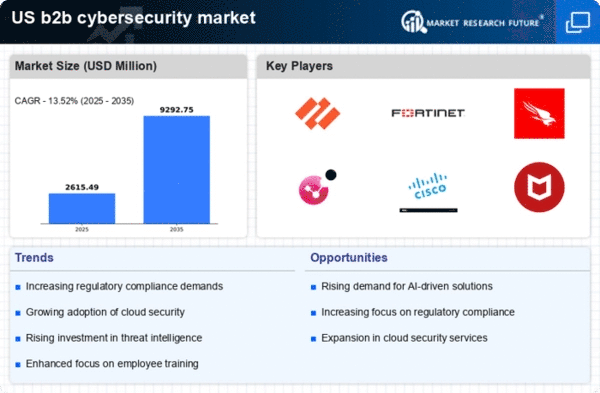Growing Cyber Threat Landscape
The b2b cybersecurity market is experiencing heightened demand due to an increasingly complex cyber threat landscape. Organizations are facing a surge in sophisticated cyberattacks, including ransomware and phishing schemes, which have escalated in frequency and severity. In 2025, it is estimated that cybercrime will cost businesses over $10 trillion annually, prompting companies to invest heavily in cybersecurity solutions. This growing threat is compelling businesses to adopt advanced security measures, thereby driving growth in the b2b cybersecurity market. As firms seek to protect sensitive data and maintain operational integrity, the need for robust cybersecurity frameworks becomes paramount, indicating a sustained upward trajectory for the industry.
Regulatory Compliance Pressures
Regulatory compliance is a significant driver for the b2b cybersecurity market, as organizations are increasingly required to adhere to stringent data protection laws. In the US, regulations such as the California Consumer Privacy Act (CCPA) and the Health Insurance Portability and Accountability Act (HIPAA) impose strict requirements on data handling and security. Non-compliance can result in hefty fines, which can reach up to $7,500 per violation under CCPA. Consequently, businesses are compelled to invest in cybersecurity solutions to ensure compliance, thereby fueling growth in the b2b cybersecurity market. This trend is likely to continue as regulatory bodies enhance their focus on data privacy and security, further driving demand for cybersecurity services.
Shift Towards Cloud Security Solutions
The transition to cloud-based services is reshaping the b2b cybersecurity market, as organizations increasingly migrate their operations to the cloud. This shift necessitates the implementation of specialized cloud security measures to protect sensitive data stored off-premises. According to industry estimates, the cloud security market is projected to grow at a CAGR of 20% through 2026, reflecting the rising need for secure cloud environments. As businesses adopt Software as a Service (SaaS) and Infrastructure as a Service (IaaS) models, the demand for integrated cybersecurity solutions tailored for cloud environments is expected to surge. This trend underscores the importance of adapting cybersecurity strategies to align with evolving technological landscapes.
Increased Awareness of Cybersecurity Risks
There is a growing awareness among businesses regarding the potential risks associated with inadequate cybersecurity measures. High-profile data breaches and cyber incidents have heightened concerns about data integrity and customer trust. As a result, organizations are prioritizing cybersecurity investments to mitigate risks and protect their reputations. In 2025, it is anticipated that spending on cybersecurity solutions will exceed $200 billion in the US, reflecting a significant commitment to safeguarding digital assets. This heightened awareness is driving the b2b cybersecurity market, as companies recognize that robust cybersecurity is not merely a technical requirement but a critical component of their overall business strategy.
Emergence of Advanced Threat Detection Technologies
The b2b cybersecurity market is witnessing a surge in the adoption of advanced threat detection technologies, such as artificial intelligence (AI) and machine learning (ML). These technologies enable organizations to identify and respond to threats in real-time, enhancing their overall security posture. In 2025, it is projected that AI-driven cybersecurity solutions will account for over 30% of the market share, reflecting their growing importance in threat mitigation. As cyber threats become more sophisticated, the need for proactive and adaptive security measures is paramount. This trend indicates a shift towards more intelligent cybersecurity frameworks, driving innovation and growth within the b2b cybersecurity market.
















